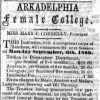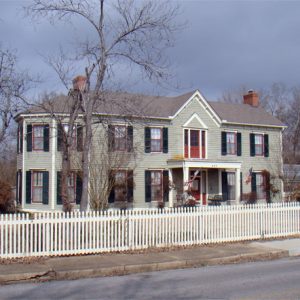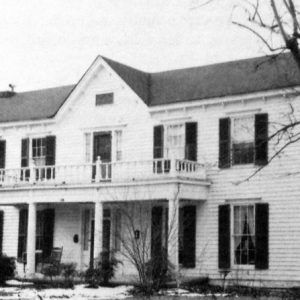calsfoundation@cals.org
Soulesbury Institute
aka: Soulesbury College
The Arkansas Conference of the Methodist Episcopal Church, South, was organized in 1836 and held its first meeting in Batesville (Independence County) that fall. The Methodist Church had a longstanding interest in education, and by 1860 it was sponsoring Ouachita Conference Female College in Tulip (Dallas County), Wallace Institute in Van Buren (Crawford County), Arkadelphia Female College in Arkadelphia (Clark County), the Washington Male and Female Seminary in Washington (Hempstead County), the Elm Springs Academy at Elm Springs (Hempstead County), and the Soulesbury Institute in Batesville.
The Soulesbury Institute was established in 1849, and classes began in January 1850. The name Soulesbury was chosen to honor Bishop Joshua Soule, a leader in organizing the Methodist Episcopal Church, South, and Francis Asbury, another early Methodist leader. The institute is also sometimes referred to as Soulesbury College—both names are correct. This confusion arises from the fact that the Arkansas Conference referred to it as the Soulesbury Institute, but when the Arkansas General Assembly issued articles of incorporation for the school in 1850, it referred to the school as Soulesbury College. The Arkansas General Assembly amended the charter in 1852, reverting to the original name.
The institute was for both male and female students and included primary, preparatory, and college departments. It was originally headed by Benjamin Watson, who had transferred from the Memphis Conference, and he was aided by two male and three female faculty members. Classes were offered in Greek, Latin, higher mathematics, French, Spanish, music, astronomy, and a number of other subjects. In 1850, land was purchased at the corner of 6th and Water streets in the School Addition of Batesville, and a Greek Revival building was erected to house the school.
In 1852, the institute requested $300 from the school fund of Independence County to purchase a “chemical and philosophical apparatus,” a term used at the time to refer to various items of laboratory equipment. James E. Cobb was named principal in 1853. In 1856, Henry J. Newell was the principal of the institute. Later that year, Judge David W. Lowe moved into Batesville from his farm near Moorefield (Independence County) to take charge of the school. By this time, there were eighty students in attendance. Judge Lowe died in August 1857, once again leaving the school without a principal.
The Soulesbury Institute continued to operate until the outbreak of the Civil War in 1861, when it was being run by T. J. Massey. After that time, there are no further references to it in the minutes of the Methodist Church. According to information provided to A. C. McGinnis by Eleanor Neill in 1957, the institute reopened after the war with M. Shelby Kennard in charge. He was assisted by two female teachers, one of whom was E. M. Dickinson. In 1870, W. T. Powell was quoted in several Appleton Company publications recommending one of their textbooks that he had just adopted for use at the institute, of which he was the president. An advertisement for the Soulesbury Institute appeared in the North Arkansas Times on September 2, 1871. It noted that the school was set to open on September 4, offering primary and intermediate grades, as well as higher English, mathematics and sciences, and ancient and modern languages; A. R. Bennick was listed as the president.
By the fall of 1873, the school had closed, and the White River Conference of the Methodist Episcopal Church, South, sold the property to Martha Glenn. The Glenns, prominent planters in the White River valley, subsequently remodeled and enlarged the building into the Glenn House, which was placed on the National Register of Historic Places.
For additional information:
Jewell, Horace. History of Methodism in Arkansas. Little Rock: Press Printing Co., 1892.
McGinnis, A. C. “Soulesbury Institute, a Frontier School.” Independence County Chronicle 5 (April 1964): 32–47.
Nancy Snell Griffith
Presbyterian College


 Glenn House
Glenn House  Soulesbury Institute
Soulesbury Institute 



Comments
No comments on this entry yet.